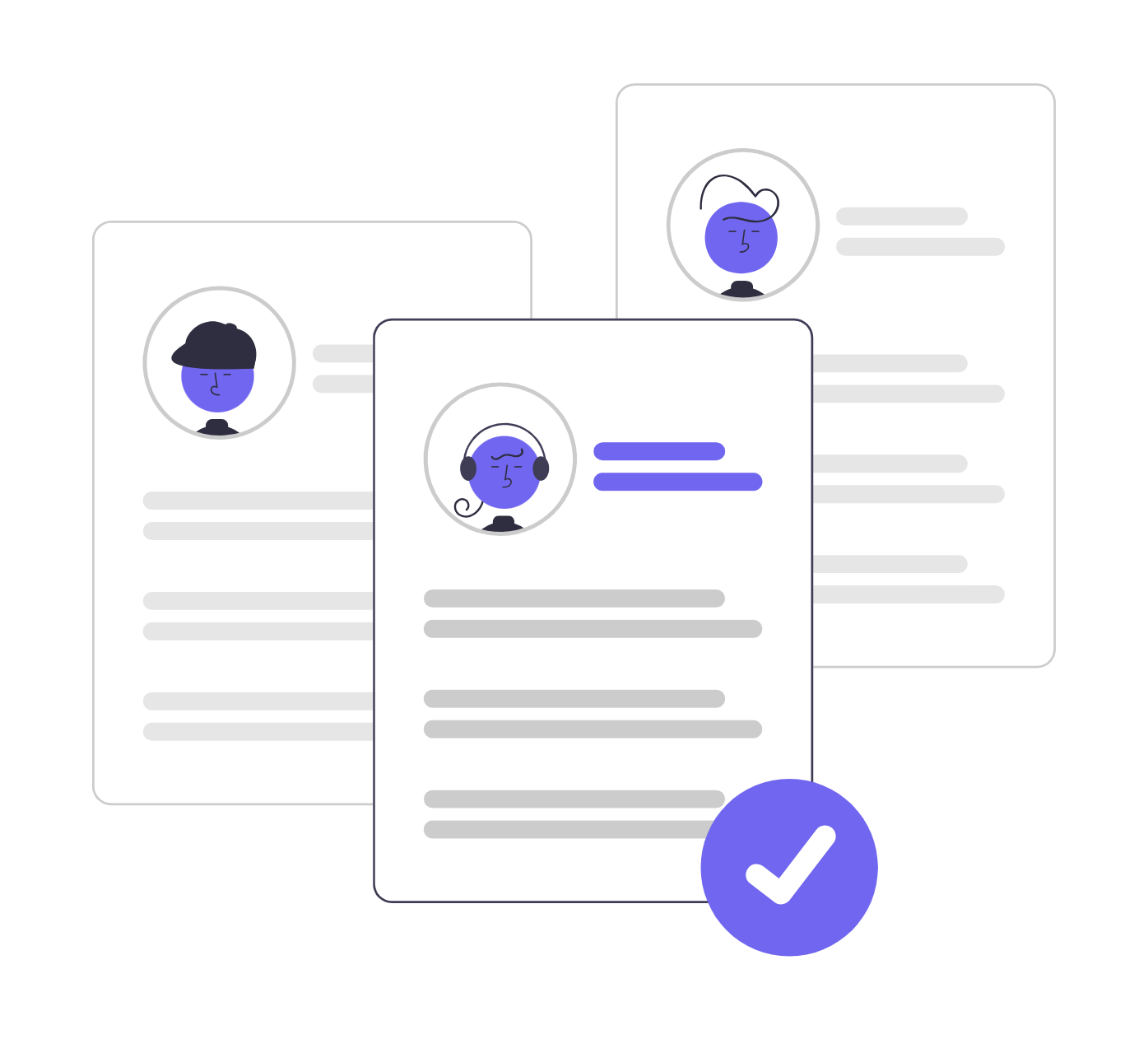Share
Are you struggling with recruiting at volume? If yes,you are probably d
For decades, employers relied on degrees as the gold standard for hiring. A college diploma signaled intelligence, discipline, and job readiness. But in today’s fast-paced, skills-hungry economy, that credential-first mindset is breaking down.
Here’s the reality:
90% of companies that hire based on skills instead of degrees report fewer hiring mistakes.
94% say skills-based hires outperform degree-based ones.
(Source: Forbes, 2024)
That’s not just a trend. It’s a hiring revolution. And if you’re still filtering résumés by where someone went to school, you’re already behind.
In this article, we’ll explore:
- Why traditional degree-based hiring is failing in 2025
- What makes skills-based hiring more effective (with data and real examples)
- Which industries are leading the change
- How to design a hiring process that prioritizes ability over pedigree
- What it means for job seekers and the future of work
Let’s dive in.
1. The Myth of the Degree: Why Academic Credentials Are Losing Ground
Historically, a college degree was shorthand for readiness. It meant the candidate had completed a structured program, passed exams, and gained knowledge in a relevant field. But the assumption that this translates into job performance has not held up.
One Reddit user summed it up bluntly:
“Degrees do not mean you have skills. Just as years of experience don’t mean you’re more capable than someone with a year.” (Source: r/business)
Degrees signal potential. Skills demonstrate results. And in industries that reward execution over theory—tech, design, marketing, trades—that gap matters more than ever.
Even seasoned hiring professionals now admit that candidates with strong degrees can fall flat on the job. One HR leader shared:
“I recruited a candidate who looked perfect on paper: great education, solid résumé. But they struggled in the role. Another candidate with no degree but hands-on experience thrived.” (Source: CareerBuddy)
2. The Rise of Skills-Based Hiring (Backed by Data)
Skills-first hiring isn’t just more inclusive—it’s also better for business.
According to Forbes:
- 90% of companies see fewer hiring mistakes when they focus on skills.
- 94% report stronger performance from skills-based hires.
And it’s not just about filling roles. The World Economic Forum predicts that nearly 50% of all workers will need reskilling by 2025. Why? Because tech is evolving faster than traditional education can keep up.
Remote work adds to the pressure. In distributed teams, you need people who can self-manage, communicate asynchronously, and solve problems independently. A degree doesn’t teach that—but experience often does.
Quickly identify your most promising candidates. WorkScreen automatically evaluates, scores, and ranks applicants on a performance-based leaderboard—making it easy to spot top talent, save time, and make smarter, data-driven hiring decisions.

3. Industries Leading the Way (And Those Holding Back)
Let’s break it down by industry:
Industry | Hiring Model |
Tech & Software Development | Skills-first |
Marketing & Creative Fields | Hybrid (skills prioritized) |
Skilled Trades (e.g., electricians, mechanics) | Skills-first |
Business, Finance, Consulting | Hybrid |
Law, Medicine, Engineering | Degree-based (due to regulation) |
Some fields still require degrees due to licensure or legal frameworks. But for the vast majority of roles, skills-first hiring is both practical and profitable.
4. The Real Risks of Relying on Degrees
Hiring by degree isn’t just outdated—it’s risky.
Here’s why:
- You overlook capable candidates who took nontraditional paths (e.g., self-taught, bootcamps, apprenticeships).
- You make false assumptions about capability based on pedigree.
- You amplify inequality. Many underrepresented groups face barriers to higher education, not to knowledge or ability.
One HR professional noted:
“Many degree holders struggle to meet job expectations, leaving managers to do extra training. Meanwhile, self-taught candidates often outperform and adapt faster.” (Source: CareerBuddy)
And this from Reddit:
“The only thing a degree guarantees is student loan payments.” (Source: r/AskOldPeople)
Workscreen Eliminates low-effort applicants—including those who use AI Tools to apply, copy-paste answers, or rely on "one-click apply." This way, you focus only on genuine, committed, and high-quality candidates—helping you avoid costly hiring mistakes.

5. What Skills-Based Hiring Actually Looks Like
Let’s get tactical. Skills-based hiring isn’t just skipping the degree requirement. It’s about building a process that reveals what candidates can actually do.
Techniques used by leading companies:
- Work Samples – Ask candidates to submit examples of past projects.
- Portfolio Reviews – Particularly effective in creative, dev, or technical fields.
- Mini-projects or MVTs – Assign real-world tasks to evaluate execution.
- Structured Interviews – Focus on behavior, scenarios, and decision-making, not just background.
- Culture Fit + Adaptability Assessments – Especially useful for fast-changing or collaborative roles.
In practice, this means putting candidates through a real-world lens—one that mirrors the job they’re being hired to do. Not the school they went to.
6. Remote Work and AI Are Accelerating the Shift
Remote and hybrid teams have changed what “qualified” looks like.
Today’s employees need:
- Autonomy
- Digital fluency
- Communication across time zones
- Ability to measure outcomes—not just hours
Meanwhile, AI is disrupting both jobs and hiring itself. Talent management systems are now capable of:
- Conducting skill audits of current employees
- Identifying internal candidates ready for new roles
- Replacing resume filters with performance-based matching
The takeaway? Hiring for degrees is static. Hiring for skills is adaptive—and future-proof.
7. How to Make Skills-Based Hiring Work (A Step-by-Step Guide)
Whether you’re a hiring manager, recruiter, or founder, here’s how to put it into action:
🔹 For Employers
- Remove unnecessary degree requirements from job listings.
- Design relevant assessments that test skills, not memory.
- Train hiring teams to evaluate output, not credentials.
- Benchmark roles by performance, not education level.
- Invest in onboarding and mentorship to nurture untapped talent.
Easily administer one-click skill tests to verify real-world ability—before you hire. 👉 Sign up now
🔹 For Job Seekers
- Build a portfolio that speaks louder than your résumé.
- Gain experience through internships, freelance, or volunteer work.
- Learn in-demand skills online (e.g., AI, cybersecurity, UX design).
- Highlight outcomes—what you built, solved, led, or improved.
- Network with intention. Referrals often bypass credential bias.
8. The Big Picture: Why This Shift Matters
Skills-based hiring is more than a cost-saving tactic—it’s a strategic advantage.
- It’s more equitable. You access untapped, high-potential talent.
- It’s more effective. You hire people who can perform from day one.
- It’s more adaptable. Your workforce evolves with your industry.
And perhaps most importantly:
You stop hiring for how good someone looks on paper—and start hiring for what they can actually do.
Conclusion: The Degree Isn’t Dead—But It’s No Longer King
Let’s be clear: degrees still matter. In regulated fields or roles where foundational theory is essential, they’re critical.
But for most businesses today, skills are the real differentiator.
The world is moving fast—and the companies that win will be the ones that hire for potential, not pedigree. Execution, not education. Results, not résumés.
Easily administer one-click skill tests with Workscreen-This way you can assess candidates based on real-world ability—not just credentials like résumés and past experience. This helps you hire more confidently and holistically.

FAQ
A: Yes—when it’s the right kind of experience. Real-world, hands-on experience often shows how a candidate performs under pressure, solves problems, and adapts to team dynamics. While degrees may signal potential, experience proves execution.
A: It’s a great thing—when done right. Skill-based hiring helps you identify high-potential candidates who may be overlooked by traditional filters. But it requires structure: assessments, benchmarks, and tools that prevent bias and guesswork.
A: Yes. Candidates who build skills through self-learning, bootcamps, freelance work, or side projects are often more driven than those who simply followed a traditional academic path. That’s a strong signal of motivation and work ethic.
A: It’s a great thing—when done right. Skill-based hiring helps you identify high-potential candidates who may be overlooked by traditional filters. But it requires structure: assessments, benchmarks, and tools that prevent bias and guesswork.
A: Yes. Candidates who build skills through self-learning, bootcamps, freelance work, or side projects are often more driven than those who simply followed a traditional academic path. That’s a strong signal of motivation and work ethic.
A: Tech, design, marketing, customer support, operations, logistics, trades, and remote-first roles. Anywhere execution matters more than pedigree, skills-first hiring gives you a clearer view of candidate performance.
A: Yes—but only in certain contexts. Regulated fields like medicine, law, and engineering require formal education. In most other industries, a degree may help—but it’s no longer a dealbreaker.
A: Use structured skill tests, scenario-based evaluations, and performance scoring. With WorkScreen.io, you can automate this process and evaluate every applicant on merit—not marketing.

